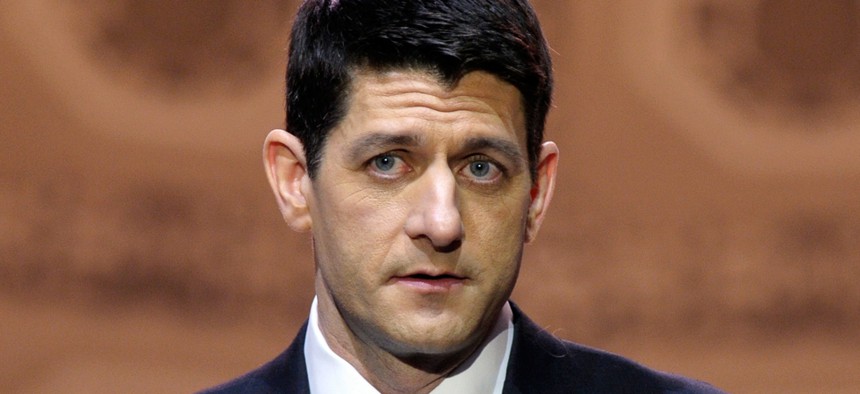Paul Ryan Wants to Give States the Lead Role in Anti-Poverty Fight

Ryan says the current network of federal aid for the poor is “fragmented and formulaic." Susan Walsh/AP

Connecting state and local government leaders
Possible 2016 presidential hopeful proposes consolidating 11 federal low-income programs, giving states more flexibility in providing aid.
Click here for a detailed list of the 11 federal low-income programs Rep. Ryan wants to consolidate.
Calling the federal government the “rearguard” in the fight against poverty, a leading Republican on Thursday unveiled a plan to consolidate up to 11 federal programs for low-income Americans, giving states more flexibility to provide customized aid to the most needy.
Wisconsin Rep. Paul Ryan said the current network of federal aid for the poor is “fragmented and formulaic” and proposed a pilot program that would envelop food stamps, housing vouchers, child care assistance and other low-income subsidies administered by various federal agencies into one funding stream. “The idea would be to let states try different ways of providing aid and then to test the results—in short, more flexibility in exchange for more accountability,” said Ryan, the 2012 Republican vice presidential nominee and possible 2016 presidential contender. “My thinking is, get rid of these bureaucratic formulas. Put the emphasis on results. Participation would be voluntary; no state would have to join. And we would not expand the program until all the evidence was in.”
The multi-pronged approach aimed at expanding opportunity for low-income Americans also would require Congress to approve any executive regulations that “disproportionately burden low-income households,” the plan said. In addition, federal agencies would be on the hook for explaining regulations in plain language, or be penalized. “If an agency violated this requirement, it would be barred from implementing that regulation until the analysis was completed, with exceptions made for rules that addressed an immediate risk to public health or safety,” the blueprint stated.
Ryan presented the draft plan, which he hoped would start a serious conversation on reducing poverty and increasing upward mobility in this country, during a speech at the American Enterprise Institute, a conservative-leaning think tank in Washington. “Our country has had enough of politics. Let's talk solutions,” Ryan wrote in a July 24 op-ed in USA Today outlining his proposal.
This year marks the 50th anniversary of the government’s War on Poverty, created during the Lyndon Johnson administration, and the House Budget Committee has held five hearings so far since January on the issue. The federal government spends about $800 billion annually on some 92 different programs to help the poor. There are more than 45 million Americans living in poverty today.
Ryan said the strategy to consolidate federal poverty programs would not cut funding. “The state would get the same amount of money as under current law—not a penny less,” the House Budget Committee chairman said. But some Democrats were skeptical, saying Ryan’s plan for consolidating low-income federal programs was merely the opening volley to future program cuts.
“The core idea of the Ryan proposal is not new,” said Maryland Democrat Chris Van Hollen, ranking member of the House Budget Committee. “It’s nothing more than a block grant gussied up with some bells and whistles.” Van Hollen; Rep. Barbara Lee, D-Calif.; and Rep. Jim McGovern, D-Mass., held a conference call with reporters Thursday afternoon. President George W. Bush pushed a similar idea during his tenure, known as “super-waivers,” giving states more flexibility to combine funds and rules for a panoply of federal anti-poverty programs.
The House Democrats also argued that Ryan’s proposal doesn’t match the reality of the House Republican budget, or the GOP record on funding low-income programs.
“If you look at the Ryan [House Republican] budget, two-thirds of the $5 trillion in cuts come from programs that help low-income Americans,” Van Hollen said. “Watch what they do, not what they say.”
The Democrats noted some areas of agreement, including Ryan’s proposal to increase the earned income tax credit for childless workers, as well as reforming the criminal justice system, particularly sentencing guidelines for non-violent offenders. Democrats, however, said they don’t support funding an expansion of EITC through the Ryan plan’s proposed elimination of various federal programs including the Social Service Block Grant, the Fresh Fruits and Vegetable Program and the Economic Development Administration.
“The rhetoric may sound like compassionate conservatism, but the reality is extreme,” said Lee, adding that Ryan’s plan was “anti-poor” and “anti-opportunity” in part because it did not support an increase in the federal minimum wage.
As for Ryan’s core proposal, the single stream of funding for anti-poverty programs, dubbed the Opportunity Grant, would require each participating state to submit to the federal government a plan meeting certain criteria for helping low-income residents. According to the plan, to receive funding states would have to spend the money solely on helping low-income people; every person who can work should work; states will have to offer recipients an additional choice for help outside the government, either through a non-profit organization, community group, or some other non-government entity; and an outside party has to measure results and track progress.
A case management-type system would be set up, and states along with other service providers would craft a customized program tailored to the individual’s needs, be it more education, job training, or subsidies for food, housing, transportation or child care.
“Think of it this way: Right now, you have to go to a bunch of different offices to enroll in a bunch of different programs,” Ryan said. “Under the Opportunity Grant, you could go to one office and work with one person for all your needs. That person would give you financial assistance, but could also act as a personal resource.”
The Wisconsin Republican said he’s “reconceiving” the federal government’s role in combating poverty, adding that Washington should support not lead such efforts. “In my view, the federal government is the rearguard—it protects the supply lines. But the people on the ground—they’re the vanguard. They fight poverty on the front lines.”





